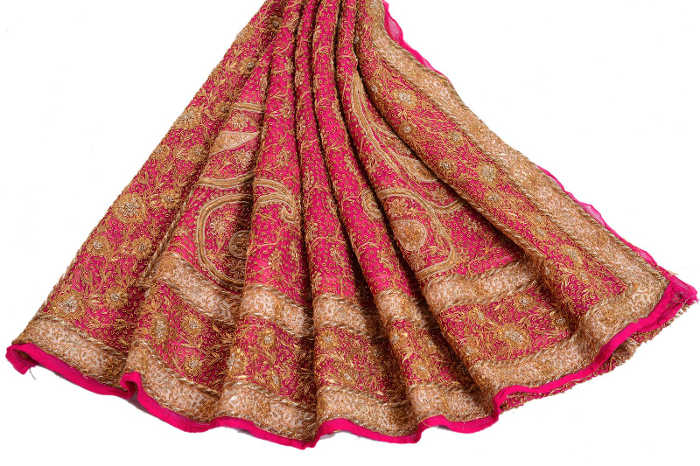FWP:
SETS == WORDPLAY
CLOTHING/NAKEDNESS: {3,5}
VEIL: {6,1}
The verse clearly relies on wordplay ('behind the veil', 'skirt-spreading', 'body', 'nakedness'), but that's almost the only thing that's clear. The first line obviously centers on 'skirt-spreading', which seems to have two opposite idiomatic meanings: worldly grace or elegance (as Platts observes and many commentators seem to assume); or Bekhud Mohani's sense of world-rejection, which would presumably be based on taking afshaani to mean 'scattering, dispersing'. I don't know how well-established Bekhud Mohani's sense is; it's somewhat suspiciously convenient as a weapon in his perpetual combat with Nazm. (Of course, it would be very Ghalibian to have the meaning go both ways.)
Then the second line is the main puzzle. The full prose form would be something like mujhe vaa-bastah-e tan kar ke merii ((uryaanii chalii ga))ii -- What?! Why did 'nakedness' do this to the speaker, and how? And what exactly did it do? Nazm rightly observes that the line is obscure and convoluted: it relies on poorly grounded hyper-abstractions that are almost impossible to visualize. For a discussion of the uses-- and positioning-- of the word 'nakedness' [((uryaanii], see {6,1}.
The verse thus also creates an apparent major problem of connection. How do the two lines fit together? The commentators read 'nakedness' [((uryaanii], a plain and literal word, as though it were 'withdrawnness' [tajarrud], a much more complex one (see the definitions above) that indeed has the kind of multiple dimensions (nakedness, withdrawal or solitude, and celibacy) that would resonate more effectively with the first line by suggesting some reasons for punishing the speaker's 'skirt-spreading' (or else, on Bekhud Mohani's reading, for deliberately frustrating his mystical quest).
I can't think of a way to improve on the 'withdrawnness'
reading. But it doesn't leave me very satisfied with the verse itself.

Nazm:
In this verse the theme is mysticism; 'nakedness' is a metaphor for withdrawnness [tajarrud], and 'skirt-scattering' for the breath. That is, I was a hermit [mujarrad], I had no relationship to physicality [jismaaniyat]. But seeing me eager for skirt-spreading, my solitude connected me to the body and took leave of me. That is, having seen me absorbed and eager in the numbering of breaths in the world of bodies, Withdrawnness imprisoned me in the cell of the body and took its leave. That is, the person who would have an ardor for skirt-spreading-- what connection would he have with withdrawnness and nakedness? In the word dar-pardah he has made the wordplay that breathing too has a connection with veiling of the bosom.
The author's intention is what has been explained, but tangledness and knottedness have befallen his meaning-- that is, after being eager for skirt-spreading, what does it mean for nakedness to take leave? Nakedness cannot be associated merely with the skirt, nor can there be skirt-spreading either. (226)
== Nazm page 226